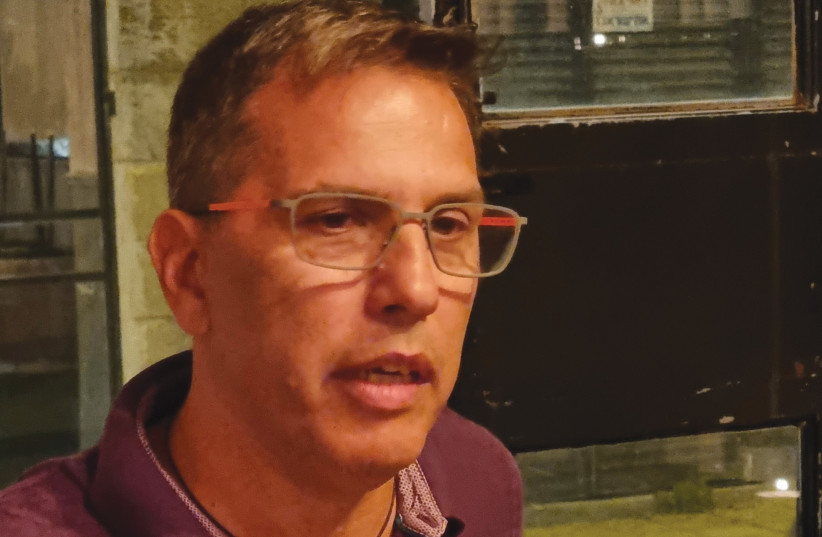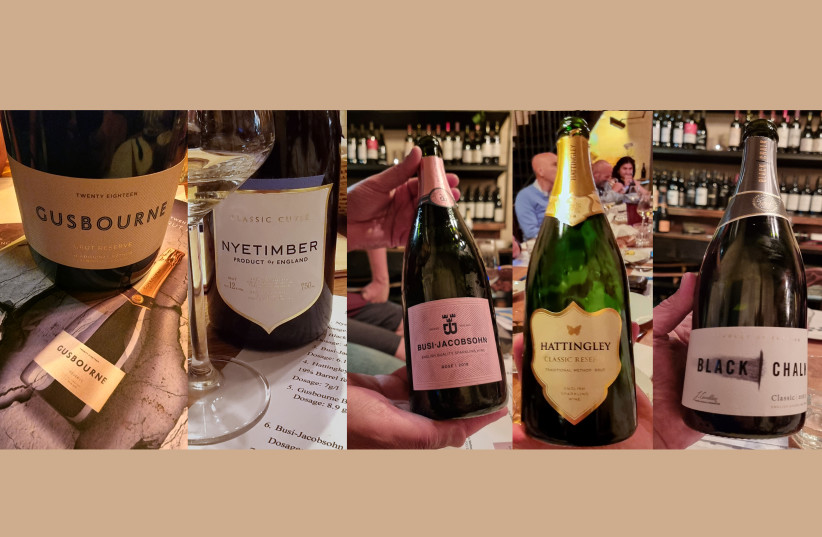I recently provided some background to English sparkling wine, which is of new interest to wine lovers and connoisseurs. The wines are relatively unknown, certainly here in Israel. So the next stage was to arrange a tasting of English wines. To my knowledge it would be the first formal tasting of English wines in Israel.
The wines were gathered by Moshé Cohen. (He spells his name with an accent over the e.) He is a wine-knowledgeable Israeli living in England who was recently awarded his Wine & Spirit Education Trust (WSET) Diploma. You can count on two hands the number of Israelis with this qualification. I am an avid fan of his podcast In the Vineyard With… He entertains and educates, while interviewing Masters of Wine and winemakers from all over the world. I am privileged to have twice been a guest, once talking about Israeli wine, and the second time about the Eastern Mediterranean.
We hatched the plot together, but he did all the work – approaching the wineries, liaising with Wines of Great Britain and then lugging all the bottles here by hand. Think of how heavy one bottle of Champagne is; well he brought over enough for a Boris Johnson COVID party!
The tasting was held at Seren DPT, an idiosyncratic wine venue in Jaffa. There, it is possible to listen and learn, or taste and buy. It proved to be an ideal place for our tasting. Incidentally Seren DPT was recently selected by the Star Wine List (a guide for the best wine restaurants and bars) as one of the leading wine bars in Israel.
The turnout was good. Every seat was taken. It appears that the idea of English wine was new and exotic even to the experienced wine crowd in Israel. Looking around the table I saw four winemakers, a few sommeliers, importers, wine critics and even a Master of Wine.

The evening began with a fascinating introduction to English wine by Moshé Cohen and a tutored tasting. He explained how Kent, Sussex and parts of Hampshire have the same chalk soil as Champagne and the effect of global warming on temperatures. He told us how the new wave of producers have investors with the finance to aim high and the appropriate level of expertise to achieve it.
The first wine to be tasted was Nyetimber. This is the big daddy of English wine. It was founded by the Moss family of Chicago, who had a dream. They followed their vision to the letter, ignoring the experts, and both created and led the revolution by being the first to plant the main varieties of Champagne (Chardonnay, Pinot Noir and Pinot Meunier) and the first to win major international awards. Not least of these was the Yarden Trophy for Best Bottled Fermented Sparkling Wine at the International Wine and Spirit Competition in London in 1998.
I was an interested party, having arranged the sponsorship by the Golan Heights Winery. What is called “the Nyetimber effect” transformed English wine from being a mere curiosity into something of great interest to the wine world. The Nyetimber estate was mentioned in the Domesday Book in 1086 and its pioneering planting of vineyards was back in 1988. It is now under different ownership, but equally determined to take them onward and upward. It is a strong brand and the No. 1 ambassador of English wine.
Black Chalk was a new name to me. It really is a start-up winery. In 2009, Jacob Leadley left his comfortable job in London to retrain as a winemaker. This was a pretty drastic career change. After a few years learning his new trade in New Zealand and Champagne, he also gained experience being a winemaker for Hattingley Valley.
He then decided to create his own small production sparkling wine. The brand name chosen was Black Chalk, which was what the old masters used to sketch ideas on canvas. Leadley and his brother-in-law initially leased a vineyard. Then in quick order, they raised the necessary funding, built a team, planted their own vineyard, opened a tasting room and then built a winery. He aimed high. This is certainly a name to watch in the future.
Busi-Jacobsohn is a family estate in East Sussex, with the first wines only released in 2017. This is the one with a Jewish connection. It is owned by Douglas and Susanna Jacobsohn. He is Swedish and Jewish. He spent some time on the Ayelet Hashahar kibbutz and has family in Israel. Susanna is Italian. The name Busi comes from a small village in Piedmont, in northern Italy.
Douglas’s profession was in marine insurance, but he always dreamed of having a farm. They moved to England because they thought it was a good place for their children to flourish, and bought a farm in 2014. The next year, they planted their vineyard and produced two sparkling wines. It is a second career that they take extremely seriously, and Douglas has become a serious, committed vineyard owner, growing his wine. Not surprisingly, they are the first to be imported to Israel. The wines are excellent.
Hattingley Valley started its journey in 2008 when big-shot lawyer Simon Robertson bought a farm and decided to plant a vineyard on some spare farmland. He was a senior partner in a city law firm, beforehand. He provided the will and the finance and he was smart enough to tie up with experts who showed him the way. The natural terroir plus finance, expertise and ambition was an unstoppable force.
The winemaker is Emma Rice, who has broad experience of every facet of the wine trade including working in a restaurant, for a retailer and then for a Burgundy importer. She then went behind a desk and became editor for Hugh Johnson, the world’s most famous wine writer.
We came across each other in the years she was editor of the Pocket Wine Book. We never met but liaised once a year over the entry for Israel, the Eastern Mediterranean and North Africa. She then studied at Plumpton College, worked in Australia and California, before returning as a winemaker. I have worked with numerous editors in the 25 years I have contributed to the Pocket Wine Book, but only Emma has crossed the aisle and emerged as a winemaker! Though as I write this, I hear she may be moving on to some new project, after 14 very successful years there.

Hattingley Valley purchases wines from a number of vineyards, and unlike many of its competitors, ages in oak barrels and has adequate reserve wines for blending. Apart from making their own wines, they also act as a contract winery for others. It is all good for business.
South African Andrew Weeber founded Gusbourne Estate in 2004 with the express purpose of making a first-class sparkling wine. He chose a place close to where his daughter lived, where he noticed the sun always shined. He was quoted as describing his biggest problem was not the weather, but convincing his family he was not off his rocker.
With great determination, a large investment and the employment of Charlie Holland as the very accomplished winemaker, they created one of England’s finest wineries. They now have vineyards on site in Kent and also in West Sussex. No expense is spared in the pursuit of quality.
The wines we tasted were as follows: Nyetimber Classic Cuvée NV. West Sussex. This is the signature wine of Nyetimber. Made from Chardonnay, Pinot Noir and Pinot Meunier. It was left for 36 months on its yeast. It was elegant, very citrusy. Certainly dry, but the residual sugar was more apparent than other wines in the tasting. It was well made though and obviously high quality.
Black Chalk Classic 2018. Hampshire. Mainly Chardonnay, and with a higher percentage of Pinot Meunier than Pinot Noir. The wine was edgy with green apple and floral notes, fresh and citrusy, with a touch of fresh baguette nicely in the background. I instantly ticked the name on the tasting sheet – my own sign to show that I liked it. In fact I liked it very much.
Busi-Jacobsohn Cuvée Brut 2018. East Sussex. This was a blend mainly of Chardonnay, balanced with Pinot Noir and Pinot Meunier. It had 24 months on its lees before disgorging. More full flavored than the others but it still was crisp, fresh and it had a nice minerality.
Hattingley Classic Reserve NV. Hampshire. Made from Chardonnay balanced with Pinot Noir and Meunier. Part barrel fermented. Green apple, lovely texture, toasty notes and hints of brioche. Wonderfully refreshing. It showed a nice balance between finesse and flavor. This received two ticks among my scribbles.
Gusbourne Brut Reserve 2018. Kent. Unusually, mainly Pinot Meunier with Chardonnay and Pinot Noir. This has more berry fruit than the others and has a delicate floral character. There was an underlying toastiness and it was balanced by a lemony freshness.
Busi-Jacobsohn Rosé Extra Brut 2018. Kent. Mainly made from Pinot Noir, with some Pinot Meunier. Left for 20 months on its lees before disgorging. This was a lovely rose with a nice fruity nose that extended through to an elegant finish.
Hattingley Rosé 2018. Hampshire. A wine made from Pinot Noir, Pinot Meunier and even a little Pinot Noir Précoce (a mutation of Pinot Noir.). It was such a beautiful rose with crunchy fruit, toasty notes and a zingy underlying acidity.
The wines were quite clearly sparkling wines of the highest quality. I found myself repeating the similar descriptions wine after wine: green apples, floral, citrusy, discreet toasty notes and a well-integrated, linear acidity. I thought they were all pretty good, but I was also quite clear about my favorites. These were both Hattingley Valley sparklers and the Black Chalk. From the muffled comments around me, I think I was not alone.
Just to give context, we also tasted the artisan Razi’el Brut and Rosé from Razi’el Winery and the homemade Buffa Petit Verdot Rosé Brut. Our most famous sparkling wine is the Yarden Blanc de Blancs. Still, our traditional method fizz is less than 1% of our total production. In England, more than 60% of their wines are traditional-method sparkling wines! I would not be surprised to see more of the wines we tasted being imported here.
In any case, next time you travel to, in the words of the Bard, “this precious stone set in a silver sea… this blessed plot, this earth, this realm, this England,” you can add wine tourism to your list of things to do, alongside visiting Big Ben, Buckingham Palace and Harry Potter. ■
The writer is a wine industry insider turned wine writer, who has advanced Israeli wines for 35 years. He is referred to as the English voice of Israeli wine. www.adammontefiore.com
